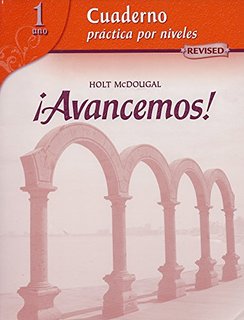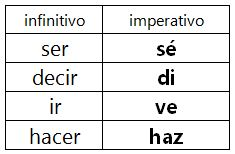
All Solutions
Page 226: Gramatica A
The purpose of this exercise is to practise the use of the imperative verbal mood in Spanish.
In this exercise, there is a list of ten sentences. You will read them carefully and decide which of them are commands, i.e. which are expressed in the imperative mood.
For the second grammatical person in singular (i.e. you), simply take the third person singular from the indicative mood, as is shown below.

Note that, if such a verb undergoes a stem change in the present tense, it will not do the same in the imperative mood.
Now, you may follow the below solutions for further guidance with respect to the exercise.
3. Pasa la aspiradora.
5. Haz la cama.
6. Pon la mesa.
9. Di el secreto.
The purpose of this exercise is to practise the use of the imperative mood in Spanish.
In this exercise, there are four incomplete sentences. You will read them carefully to understand them. Then, you will use the appropriate conjugated form in the imperative mood of the given verb. These will all be direct commands to someone, thus you will only use the second grammatical person in singular. You may follow the below solutions for further guidance.
2. sirve
3. barre
4. saca
The purpose of this exercise is to practise the use of the verbal periphrasis “acabar de + infinitivo”.
For this exercise, you will answer three questions about what you just did. Read the questions carefully and respond accordingly. Given the personal nature of this exercise, only use the below examples as a reference.
Remember, in verbal periphrases you conjugate the auxiliary verb acording to the grammatical subject, and you keep the main verb in its infinitive form. For instance, in the phrase “Acabamos de comer.”, we see from the grammatical ending that the subject is “we” and the main verb means “to eat”. Thus, the example means that “we have just eaten”.
1. Acabo de hacer la tarea.
2. Acabo de hablar con mi tía.
3. Acabo de ir al parque.

